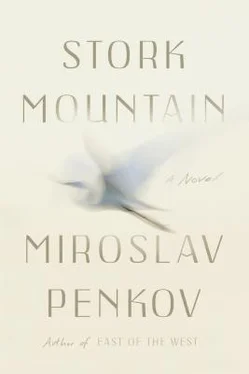Miroslav Penkov - Stork Mountain
Здесь есть возможность читать онлайн «Miroslav Penkov - Stork Mountain» весь текст электронной книги совершенно бесплатно (целиком полную версию без сокращений). В некоторых случаях можно слушать аудио, скачать через торрент в формате fb2 и присутствует краткое содержание. Год выпуска: 2016, Издательство: Farrar, Straus and Giroux, Жанр: Современная проза, на английском языке. Описание произведения, (предисловие) а так же отзывы посетителей доступны на портале библиотеки ЛибКат.
- Название:Stork Mountain
- Автор:
- Издательство:Farrar, Straus and Giroux
- Жанр:
- Год:2016
- ISBN:нет данных
- Рейтинг книги:4 / 5. Голосов: 1
-
Избранное:Добавить в избранное
- Отзывы:
-
Ваша оценка:
- 80
- 1
- 2
- 3
- 4
- 5
Stork Mountain: краткое содержание, описание и аннотация
Предлагаем к чтению аннотацию, описание, краткое содержание или предисловие (зависит от того, что написал сам автор книги «Stork Mountain»). Если вы не нашли необходимую информацию о книге — напишите в комментариях, мы постараемся отыскать её.
Stork Mountain — читать онлайн бесплатно полную книгу (весь текст) целиком
Ниже представлен текст книги, разбитый по страницам. Система сохранения места последней прочитанной страницы, позволяет с удобством читать онлайн бесплатно книгу «Stork Mountain», без необходимости каждый раз заново искать на чём Вы остановились. Поставьте закладку, и сможете в любой момент перейти на страницу, на которой закончили чтение.
Интервал:
Закладка:
“Look, Grandpa!” I wanted to say, but I knew he too could see them. Rising within us and with the smoke — Captain Kosta, the endless chain of suffering Strandjans, the girls we loved — finally free from our grip, liberated through the fire.
I felt light. I felt light-headed. How I wanted to throw myself into the flame and let it free me too.
“Not yet, my boy,” I heard Grandpa saying. “The embers aren’t ready yet.”
Or maybe it was my own voice I could hear? Or was it Lenio’s? Elif’s? The voice of Captain Kosta, Murad the Godlike One’s, Nazar Aga’s? I couldn’t really tell. Nor did it matter. The nominalia is never ending. Like a river, like wind, like flame, it always changes in its shape. But underneath that shape it’s always water flowing, it’s always air, always fire.
NINETEEN
WHEREVER THE GODDESS LADA WANDERED, Attila followed, buried within the tresses of her hair. With each day, his weight grew greater. It drank away her beauty. It drained her strength. Her sisters begged her to forget him; her brothers ordered her to let him go. And yet, she longed to see his face once more, to hear his whisper. If only she could pry the coffin open and kiss his lips.
“You’ll never bring him back this way,” she heard a voice say, as rotten as the throat from which it slithered. Starost, the goddess of old age, had left her swamp and now her deathly fingers were brushing Lada’s cheeks.
“Your uncle Veles loves you,” Starost said. “Go to the netherworld and ask his help.”
That Veles loved her was something Lada knew. More than a few times, heart filled with fright, she had thought of bowing at his feet and begging for Attila back. And yet it wasn’t fright that stopped her.
“I don’t know how to find the path to his world,” she said, ashamed. “My eyes have never seen it.”
How wickedly Starost smiled. How ugly she grew.
“Mine have.”
* * *
Down the path Lada stumbled, her eyes the eyes of Old Age. All she saw were shadows, but shadows were enough to mark the way, like crumbs. Through the falls of all-purging fire the goddess plunged and then the Death Winds took her, the way a great river takes a tiny leaf. Like this she flowed through the nether, toward the One Tree.
A single tree grows at the underworld’s navel, colossal, eternal, its branches alive with wind. As dirty blood must be renewed in the heart’s chambers, so must the souls of men flow through the great tree. One by one the souls rush through the branches. One by one the branches catch them and strip them of their faces. There they remain, these masks, for all eternity, like fruit, while faceless the souls rejoin the rushing winds. The winds of life now.
Gently Veles plucked a face; gently he wore it as his own. And with his lips, Attila kissed Lada back.
“I’ve come for you,” she said, and sought his hand. She was surprised to see him pull away.
“What I was once is gone,” he said. “Only this mask remains. And I am not a mask.”
Perhaps she understood that he was right. And yet, how could she let him go?
* * *
Wherever Lada wandered, Attila followed, rotting within the tresses of her hair. She heard him, begging her to be forgotten, his voice unshakable, incessant. Months turned to years, years into decades, but he remained. In vain, her sisters tried to console her. In vain, her brothers attempted to cut the hair and set her free. Weak of sight, tormented of hearing, she guarded Attila and his triple coffin the way the lamya guards a golden apple. Her gold was grief. The grief consumed her. It drove her mad.
* * *
Mad, Lada roamed fields and forests, tortured by Attila’s cries. Whatever she passed, spring with the stench of rot devoured it. Crops grew tall in winter; orchards bloomed under heavy snows. But once Lada had moved along, all blossom withered. Famine swept the people up and in their anger it was Lada’s father, the god Perun, they blamed. Their sacrificial fires turned to ash and soon Perun was weakened too. No longer could he force his daughter back into his mountain. No longer could he control all other gods.
Impudent Starost leapt out of her swamp, stood before Lada.
“My child,” she croaked. “I’ll help you drown his voice in silence. Give me your hearing and I will give you mine.”
* * *
With the eyes of Old Age and with Old Age’s ears, Lada was roaming the mountain. All that she heard were shadows — voices like water rushing, trapped beneath thick ice. But even in the trap of shadows, Attila’s cries kept ringing loud.
Until one day Lada caught a whisper. The call of some old god, almost forgotten, a god whom Old Age had taken long before. And following the whisper, she came upon a temple in the mountains. There in the temple the maenads danced.
How beautiful their madness seemed to Lada, to worship a god so few remembered now. How furious their dance. And in the sweetness of their wine it was some distant lightness that Lada managed to recall. The more she drank, the thicker her thirst grew, the faster she forgot her father. The more fiercely she spun, the deeper Attila sank within her heart.
* * *
The wick crackles, the flame bends, and our shadows sway across the wall and ceiling. I am a boy and Grandpa is a grandpa, though Old Age is still a long ways off from him. The year is 1991. The month is maybe January. Tonight, the power won’t be coming back for one more hour. It’s much too soon for bed, so here we are: around the candle, in the kitchen. My father leafing through a paper in the gloom, my mother mending one of my socks. And Grandpa telling me a story.
“So dark!” my mother says. “All these stories you tell him. So unhappy.”
“If you ask me, not dark enough ,” my father says, and rustles the pages of his paper. “It’s good for him to hear unhappy tales.”
“It’s bad for me ,” my mother says, and keeps on talking. The candle flickers with her breath and our shadows stir again. Mine conquers her and Grandpa’s shadows, it swallows Father’s up. And then it’s me and Grandpa by the candle. And no one else. No grumpy parents, no power outages, no lines for milk and bread, no mobs demanding revolutions. Elif hasn’t come to pass yet. The storks haven’t come to pass, nor have the turbines. Even America is still a premonition, coiled within my father’s restless gut.
I am a boy and Grandpa is a grandpa. Between us stands a candle, not the ocean.
“Tell me, Grandpa, what happened to Lada?”
“Why, see it for yourself. Look into the flame. Watch the stories that its current drags. Beautiful Lada, blind and deaf, she has long forgotten Attila. But his body remains, buried in her hair. And so his spirit knows no rest.”
And sure enough, I see them, inside the flame. A face floating in a mountain creek, turning and tossing like a fish, mouth opening and closing. Lada has dipped her blistered feet to cool them and soon the face has tangled in her toes. It bites her as she peels it off and brings it to the surface. Let go of me! it cries. A handsome, dear face. It begs to be forgotten. Demands to be allowed to rest.
I see the goddess, stumbling down a dark path, following the trail of shadows. Tooth, nail, ax, and saber. All was in vain. No god, no mortal man could cut the tresses of her hair. So now she stands before the nether lord again and begs his help. “Release them for a day,” she asks, and as before he has no strength to turn her down.
Like wild water the horde of Huns ascended. A hundred horses with their riders, a thousand. Then a hundred thousand. Hooves of gold, long dead, now crossed and then re-crossed the tresses, and split them, one by one.
How heavy the ropes of hair fell at Lada’s feet. How light she felt now.
Читать дальшеИнтервал:
Закладка:
Похожие книги на «Stork Mountain»
Представляем Вашему вниманию похожие книги на «Stork Mountain» списком для выбора. Мы отобрали схожую по названию и смыслу литературу в надежде предоставить читателям больше вариантов отыскать новые, интересные, ещё непрочитанные произведения.
Обсуждение, отзывы о книге «Stork Mountain» и просто собственные мнения читателей. Оставьте ваши комментарии, напишите, что Вы думаете о произведении, его смысле или главных героях. Укажите что конкретно понравилось, а что нет, и почему Вы так считаете.











